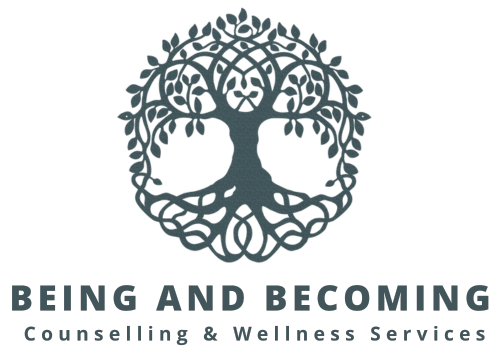BEING AND BECOMING COUNSELLING AND WELLNESS SERVICES
Depression Therapy
Providing a safe space to help you overcome depression and reconnect with joy.
Depression Therapy can help you:
FEEL LIKE YOURSELF AGAIN
FIND CONNECTION & SUPPORT
FEEL JOY & HAPPINESS
When you can’t get out from under the shadow of depression.
Depression is more than just feeling sad; it’s a deep emptiness, lack of motivation and exhaustion that can make doing even simple things challenging. Depression permeates all areas of your life and makes you unable to experience joy or pleasure doing things you used to enjoy. You may find it hard to connect with others and may start to wonder if you will ever feel happy again.
We are here to help.
There is hope.
Depression Therapy May Help When You Are:
Persistently feeling sad, irritable or flat
Having difficulty getting out of bed or starting your day
Experiencing loss of interest in activities you used to enjoy
Experiencing changes in eating or appetite (i.e., over-eating or under-eating)
Sleeping long hours without feeling rested, or having difficulty sleeping
Having difficulty focusing or thinking clearly
Experiencing loss of motivation
Feeling chronically exhausted
Having difficulty connecting with others
Withdrawing from others and isolating yourself
Having difficulty performing basic tasks
DEPRESSION THERAPY IN BURNABY
What is Depression Therapy and How Does it Work?
Depression is more than feeling sad or having a bad day. It is persistent and doesn’t easily improve with time. Everyone experiences depression differently. Some people experience depression as a constant sadness and inability to experience joy or pleasure. Others may feel continually irritable or easily frustrated. Some people feel consumed by self-criticism and feelings of worthlessness. Many people with depression hide their feelings so well that no one can tell they’re struggling. Despite these differences, common signs of depression consist of persistent sadness or low mood, fatigue, difficulty concentrating, feelings of worthlessness, and a loss of interest in activities that you used to enjoy.
Depression therapy offers a space to begin to untangle and understand the thoughts, behaviours and experiences that may be fuelling your depression. By exploring and addressing these underlying issues, you can begin to make the necessary changes to help you reconnect with yourself and increase your capacity to feel joy and happiness.
You don’t have to go through this alone.
Reaching out is a sign of strength.
Modalities offered for Depression Therapy
-
CBT has been shown to be an effective treatment for depression. It focuses on helping individuals address faulty or unhelpful ways of thinking, and change patterns of behaviour that work to maintain the depression. CBT does not focus on the past but instead helps individuals make meaningful changes in their lives now.
-
MBCT combines traditional cognitive therapy with mindfulness strategies to address depression. MBCT has been shown to be effective at reducing depressive symptoms and reducing the risk of depressive relapse.
-
IFS therapy maintains that everyone has different parts (e.g., an inner critic, a perfectionist part, a procrastinator part) as well as a Self. Some parts carry trauma or painful emotions and other parts try to protect these wounded parts. Protector parts can get stuck in extreme roles that have adverse consequences. IFS aims to heal parts from the traumas they have experienced or the burdens they carry so that the system can come into balance and the individual can be more Self-led.Early research suggests IFS is as effective as other evidence-based approaches in the treatment of depression).
-
Self-criticism correlates with severity of depression and individuals with high levels of self-criticism often respond differently to treatment (e.g., they may experience fewer benefits form CBT). Compassion-focused therapy (CFT) may be well-suited for those who are high in self-criticism. CFT emphasizes the cultivation of self-compassion and compassion for others to help counteract self-criticism and shame, and promote healing and well-being.
-
Acceptance and commitment therapy (ACT) is a mindfulness-based behavioural therapy that combines acceptance and mindfulness techniques with commitment and behaviour change strategies. Instead of trying to change your thoughts, ACT involves accepting the full range of your thoughts and emotions and teaches you new ways to respond to distressing thoughts and emotions. ACT also focuses on helping you identifying your personal values and committing to taking steps to incorporate changes that align with your values and lead to positive change. ACT has been shown to be an effective treatment for depression.
What you can expect to get out of Depression Therapy
Each person’s journey to healing from depression will be different, but in time you may notice that you have:
Relief from persistent sadness
Greater access to pleasant emotions
Increased energy and motivation
Increased confidence
Improved sleep
Improved ability to concentrate
Regained interest and enjoyment in activities
Better relationships and social connections
Greater ability to manage your emotions
Greater capacity to handle the ups and downs of life
Therapists Offering Depression Therapy
-

Dr. Jan Klimas
Registered Clinical Counsellor
-

Semhar Ghedela
Canadian Certified Counsellor
-

Dr. Margaret Brennan
Registered Psychologist
-

Pawandeep Kaur
Registered Clinical Counsellor
Common Questions about Depression Therapy
-
Depression symptoms can vary widely but generally include:
Emotional Symptoms:
Persistent sadness or low mood (some people describe feeling flat, numb or “meh”)
Loss of interest or pleasure in activities you once enjoyed
Feelings of hopelessness, emptiness, worthlessness or excessive guilt
Irritability or frustration
Physical Symptoms:
Fatigue or lack of energy
Changes in appetite or weight (either increasing or decreasing)
Sleep disturbances, such as insomnia or excessive sleeping
Physical aches and pains without a clear physical cause
Cognitive Symptoms:
Difficulty concentrating, making decisions, or remembering things
Slowed thinking or speech
-
Several treatments are effective for managing depression:
Psychotherapy:
Cognitive Behavioural Therapy (CBT) - helps individuals change unhelpful thinking and behavioural patterns
Acceptance and Commitment Therapy (ACT) - teaches individuals how to respond to their distressing thoughts and feelings more effectively and helps them commit to making behavioural changes in-line with their values and that support their well-being.
Medication:
Serotonin reuptake inhibitors (SSRIs) are the most commonly prescribed antidepressant medications. They tend to be safe and have fewer side effects than other medication options. Other commonly prescribed medications include serotonin and norepinephrine reuptake inhibitors (SNRIs), atypical antidepressants and tricyclic antidepressants.
Lifestyle Changes:
Engaging in regular physical activity, eating a balanced diet, getting adequate sleep, maintaining social connections and using stress management techniques can also help in managing depression.
-
The timeline in which you will experience improvement in your symptoms may vary:
Initial improvement: some individual may start to feel better within a few weeks of starting therapy or medication.
Noticeable progress: significant changes and improvements are often noted in 3 to 6 months of attending regular therapy. Regular sessions help maintain momentum in the therapeutic process.
Long-term management: for more chronic or severe depression, therapy may take 6 months to a year or longer to address underlying issues and make sustainable changes. Ongoing support may be necessary to prevent relapse.
-
During the first session you can expect the following:
Initial assessment: the therapist will conduct a comprehensive assessment to understand your symptoms, medical history, and specific concerns. This may involve filling out questionnaires or discussing your experiences.
Goal setting: you will discuss your goals for therapy and what you hope to get out of counselling. This helps the therapist tailor the treatment plan to your needs and preferences.
Treatment plan: the therapist will outline a personalized treatment plan, including the types of therapy and strategies that will be used.
Building rapport: establishing a trusting and comfortable relationship with your therapist is crucial. The first session is an opportunity to see if you feel at ease with the therapist and their approach. You can also book a free phone consultation before the first appointment to see if you are a fit.
-
Deciding whether medication is right for managing depression is a personal decision and is best done with the guidance of a healthcare provider who understands your unique situation. Important factors to consider include:
The severity of your symptoms
The impact on your daily functioning
Your response to therapy
Your personal and family history
Concerns around self-harm and suicidal ideation




